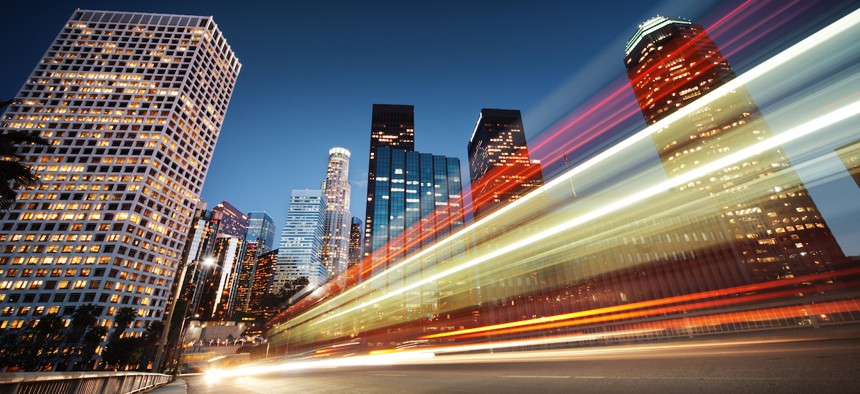Smart cities need a new mindset, not just new technology

logoboom/Getty Images
A smart city is more than just a buzzword these days. It’s a mindset and skill set that employees must have to navigate today’s challenges, one expert says.
For decades, the term “smart city” has been a buzzword in a movement to use high-tech solutions to solve urban problems. First pushed by technology companies determined to sell products to local governments, the term was eventually embraced by elected leaders to show they are ahead of the innovation curve.
But the popularity of the term itself has grown stale in the last few years as events like the COVID-19 pandemic and the profound impacts of climate change have prompted those in the smart city movement to revisit what it means in the face of today’s challenges.
To be a smart city now, one expert said, it needs to not just embrace emerging technologies, but to also embed a new mindset and skill set among its employees.
“Smart cities are a way of embedding a mindset,” Joseph Breems, senior executive and director at the National League of Cities’ Center for Municipal Practice, said during Route Fifty’s Future Cities event this week. “And with that, a skill set to continuously think new about what we're doing, to be responsive to new information, new data, [and] to be adaptive to that information.”
That new mindset includes being more fluid in how government contracts are written and finding new ways to pay for pilot projects before relying on general fund dollars to fund them more permanently, Breems said. Employees may also need to be more adept in managing and analyzing data to help with decision-making. And it is incumbent on elected officials to “take some of the heat” and provide political cover for their employees to experiment and iterate.
City leaders who just focus on introducing new technologies are “halfway to the mark” of being a smart city, Breems said. They still need to shift the mindset and culture of their employees to really be able to call themselves smart.
“If we're going to be receiving all of these new data points, do we have the staff in place to be able to look at and interpret those data?” Breems said. “Do they have the relative freedom of movement and investigation of policy to then make changes based on the data they're receiving and interpreting? And then do they have the political cover to implement those changes? It's got to be people augmented by technology.”
Technology will always play a role in the evolution of a smart city, Breems said, but there will also always be “an evolution of what is emphasized.” A decade ago, sensor technology and the Internet of Things was a big point of emphasis in the smart city movement. The cost of building and implementing the networks has deemphasized those approaches, as has the rise of artificial intelligence and other emerging technologies.
There are plenty of challenges ahead for city leaders, as they navigate various issues like the need to revitalize their downtowns, promote affordable housing, keep the public safe, mitigate the impacts of climate change and find ways to reduce traffic congestion. Breems said the definition of a smart city may shift to further emphasize resiliency in the face of these issues. Meanwhile, the idea of regional collaboration may have a “new moment” as governments of all sizes look to work together to face these challenges down.
The COVID-19 pandemic in many ways forced the evolution of a smart city to its current form today. Cities had to be responsive and adapt to new information quickly. City governments had to migrate many of their operations to a virtual environment, in efforts that previously may have taken years but instead took weeks or months. Breems said the events of 2020 showed that “municipal government really is a lot more adaptive than people give it credit for.”
Working for Washington, D.C., at the time, Breems was involved in figuring out how to repurpose public facilities as testing and vaccination sites, as well as in making municipal services available remotely and keeping them functional. He said there are lessons to be learned from that period.
“I saw many people do some amazing work over the course of the pandemic,” he said. “Right now, a smart city, will really be thinking about, how do we hold on to many of those innovations going forward?”






